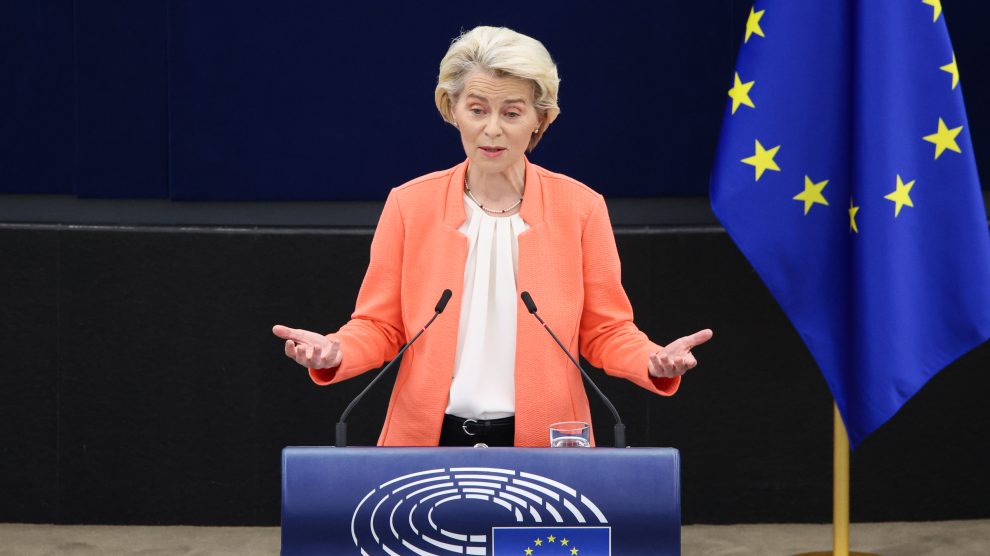In her State of the Union speech on September 13, European Commission President Ursula von der Leyen renewed calls for Ukraine and Moldova’s EU integration, and made it clear the Romania and Bulgaria should be admitted to the Schengen zone.
Each September, the president of the European Commission, Ursula von der Leyen, addresses the European Parliament to deliver the State of European Union address, a preview of the legislative initiatives envisioned for the following 12 months.
The speech marks the official start of the EU’s working year and coincides with parliament’s first session after the long summer break.
- Is enlargement back on the EU agenda?
- BRICS is no alternative to the EU
- Moldova’s shift towards the West looks increasingly irreversible
This year, von der Leyen threw her weight behind the idea of expanding the European Union to at least 30 members, saying enlargement could be a “catalyst for progress” in the bloc.
“The future of Ukraine is in our Union,” said von der Leyen. “The future of the Western Balkans is in our Union. The future of Moldova is in our Union. And I know just how important the EU perspective is for so many people in Georgia.”
The qualified wording of her statement on Georgia suggests that von der Leyen is well aware that the Tbilisi government does not currently share the unequivocal backing for EU membership of its people.
Addressing concerns of some current members, notably France, that further expansion would make the EU unworkable, von der Leyen said that the EU had proven that it can be a geopolitical union and had showed we can move fast when its is united.
“And I believe that Team Europe also works with more than 30 members,” she added. “We cannot—and we should not—wait for treaty change to move ahead with enlargement. A union fit for enlargement can be achieved faster.”
However, von der Leyen also warned that accession to the EU for countries such as Ukraine, Moldova, and the Western Balkans must be merit-based, contingent on far-reaching reforms in candidate countries.
“The Commission would always defend this principle,” she noted. “It takes hard work and leadership, but there is already a lot of progress. We have seen the great strides Ukraine has already made since we granted them candidate status. And we have seen the determination of other candidate countries to reform.”
Support for Ukraine
On Ukraine, von der Leyen said that EU support for the country will endure. She noted that since the start of Russia’s war, four million Ukrainians have found refuge in the European Union.
“I want to say to them that they are as welcome now as they were in those fateful first weeks.”
In Ukraine itself, the EU has provided 12 billion euros this year alone to help pay wages and pensions, and to help keep hospitals, schools and other services running.
“And through our ASAP proposal we are ramping up ammunition production to help match Ukraine’s immediate needs,” von der Leyen told parliament, adding that looking further ahead, the Commission has proposed an additional 50 billion euros over four years for investment and reforms.
“This will help build Ukraine’s future to rebuild a modern and prosperous country. We will be at Ukraine’s side every step of the way, for as long as it takes.”
Von der Leyen did not directly address, however, the ongoing row over Ukrainian agricultural imports, referring only to the need for Europe’s farmers to work together.
After Russia blocked most Ukrainian grain shipments via the Black Sea following its invasion, Ukraine scrambled to find alternative routes through the EU. Some EU members objected, claiming that the flow of grain was undercutting their own farmers.
In April, Ukraine’s neighbours, Poland, Hungary, Bulgaria, Slovakia and Romania, agreed a deal with the EU to allow the transit of Ukrainian wheat and maize, while banning domestic sales. The deal is due to expire on September 15, but the five countries want it extended at least until the end of this year.
Poland’s Prime Minister Mateusz Morawiecki confirmed on September 12 that the country will not reopen its domestic markets to Ukrainian grain imports.
On Schengen, ‘no further delay’
Von der Leyen’s speech contained encouraging words for Romania and Bulgaria, who have so far been denied entry to the Schengen border-free travel area.
Schengen accession needs unanimous backing from all the area’s members—23 EU nations as well as Liechtenstein, Iceland, Norway and Switzerland.
The European Commission has long made it clear that both Romania and Bulgaria meet the technical criteria required for membership, making Austria’s veto purely political. “A decision that willingly ignores the fact that the conditions for membership have been met,” said Romania’s then Interior Minister Lucian Bode last year.
Von der Leyen said that both countries were now examples of “best practice” on both asylum and migrant returns.
“They have proved it: Bulgaria and Romania are part of our Schengen area,” she said, “so let us finally bring them in—without any further delay.”
While the Netherlands has in recent months signalled that is ready to admit the pair, Austria has consistently held firm. On August 25, Austria’s interior minister, Gerhard Karner, said that, “the Schengen system as a whole does not work. We are not open to its expansion.”
Photo: Ursula von der Leyen addressing the European Parliament on September 13. © European Union.
Unlike many news and information platforms, Emerging Europe is free to read, and always will be. There is no paywall here. We are independent, not affiliated with nor representing any political party or business organisation. We want the very best for emerging Europe, nothing more, nothing less. Your support will help us continue to spread the word about this amazing region.
You can contribute here. Thank you.


